University Essay: Nursing Workplace Factors & Mental Health
VerifiedAdded on 2022/10/18
|7
|2086
|343
Essay
AI Summary
This essay delves into the critical issue of nurses' mental health, specifically examining the detrimental effects of workplace factors such as bullying and shift work. The essay highlights the demanding nature of the nursing profession, emphasizing the emotional and physical toll it takes on healthcare professionals. It explores the prevalence of bullying within nursing environments, discussing its impact on stress levels, depression, and anxiety. Furthermore, the essay analyzes the challenges associated with shift work, including long hours and inadequate staffing, and their contribution to nurses' mental health struggles. The essay also identifies the importance of organizational leadership in fostering a supportive environment and the need for implementing strategies to promote resilience among nurses, ultimately aiming to enhance their mental wellbeing and improve patient care. The essay concludes by emphasizing the need for immediate attention from both government and healthcare organizations to address the issues faced by nurses, ensuring their psychological well-being and job satisfaction.
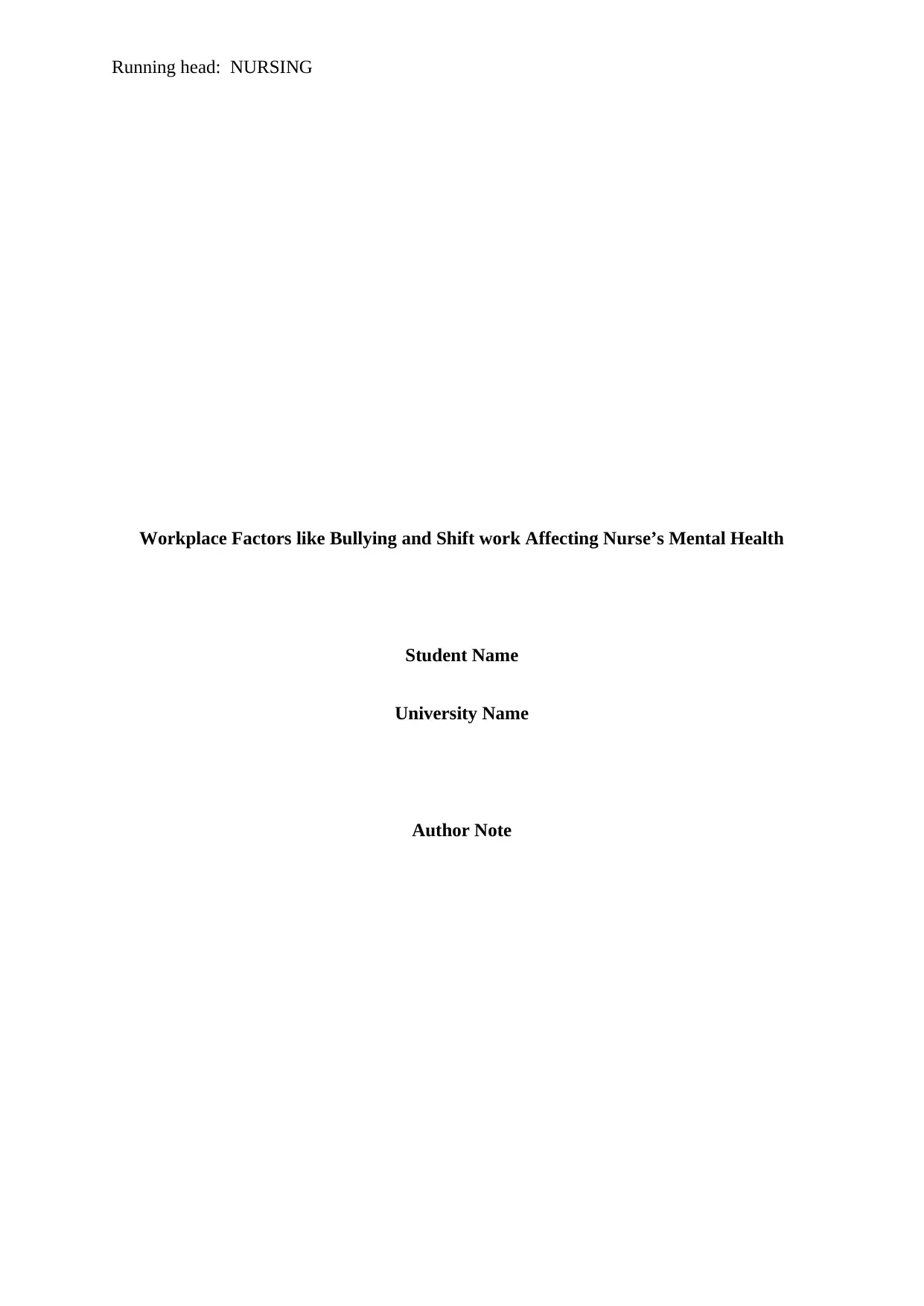
Running head: NURSING
Workplace Factors like Bullying and Shift work Affecting Nurse’s Mental Health
Student Name
University Name
Author Note
Workplace Factors like Bullying and Shift work Affecting Nurse’s Mental Health
Student Name
University Name
Author Note
Paraphrase This Document
Need a fresh take? Get an instant paraphrase of this document with our AI Paraphraser
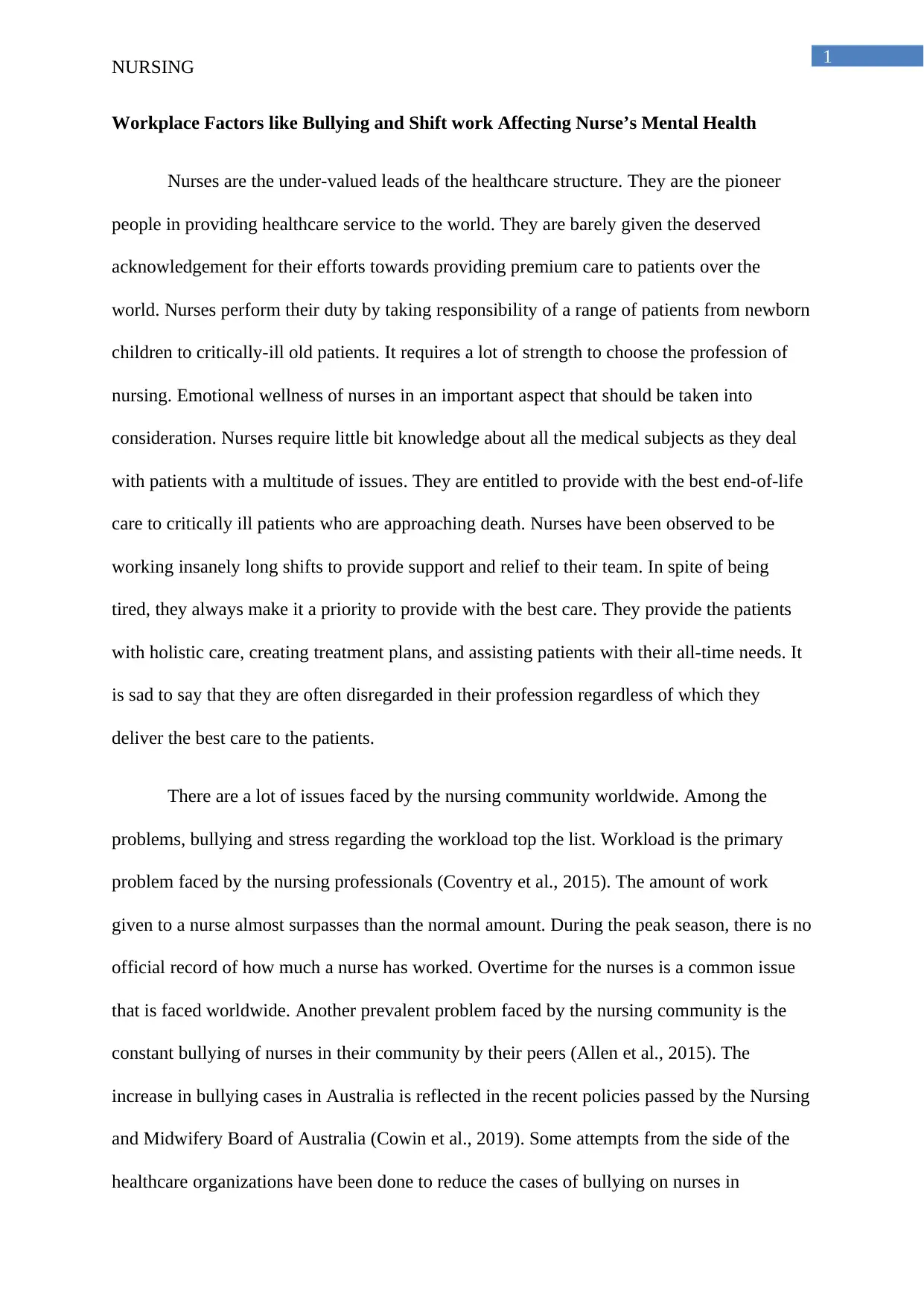
1
NURSING
Workplace Factors like Bullying and Shift work Affecting Nurse’s Mental Health
Nurses are the under-valued leads of the healthcare structure. They are the pioneer
people in providing healthcare service to the world. They are barely given the deserved
acknowledgement for their efforts towards providing premium care to patients over the
world. Nurses perform their duty by taking responsibility of a range of patients from newborn
children to critically-ill old patients. It requires a lot of strength to choose the profession of
nursing. Emotional wellness of nurses in an important aspect that should be taken into
consideration. Nurses require little bit knowledge about all the medical subjects as they deal
with patients with a multitude of issues. They are entitled to provide with the best end-of-life
care to critically ill patients who are approaching death. Nurses have been observed to be
working insanely long shifts to provide support and relief to their team. In spite of being
tired, they always make it a priority to provide with the best care. They provide the patients
with holistic care, creating treatment plans, and assisting patients with their all-time needs. It
is sad to say that they are often disregarded in their profession regardless of which they
deliver the best care to the patients.
There are a lot of issues faced by the nursing community worldwide. Among the
problems, bullying and stress regarding the workload top the list. Workload is the primary
problem faced by the nursing professionals (Coventry et al., 2015). The amount of work
given to a nurse almost surpasses than the normal amount. During the peak season, there is no
official record of how much a nurse has worked. Overtime for the nurses is a common issue
that is faced worldwide. Another prevalent problem faced by the nursing community is the
constant bullying of nurses in their community by their peers (Allen et al., 2015). The
increase in bullying cases in Australia is reflected in the recent policies passed by the Nursing
and Midwifery Board of Australia (Cowin et al., 2019). Some attempts from the side of the
healthcare organizations have been done to reduce the cases of bullying on nurses in
NURSING
Workplace Factors like Bullying and Shift work Affecting Nurse’s Mental Health
Nurses are the under-valued leads of the healthcare structure. They are the pioneer
people in providing healthcare service to the world. They are barely given the deserved
acknowledgement for their efforts towards providing premium care to patients over the
world. Nurses perform their duty by taking responsibility of a range of patients from newborn
children to critically-ill old patients. It requires a lot of strength to choose the profession of
nursing. Emotional wellness of nurses in an important aspect that should be taken into
consideration. Nurses require little bit knowledge about all the medical subjects as they deal
with patients with a multitude of issues. They are entitled to provide with the best end-of-life
care to critically ill patients who are approaching death. Nurses have been observed to be
working insanely long shifts to provide support and relief to their team. In spite of being
tired, they always make it a priority to provide with the best care. They provide the patients
with holistic care, creating treatment plans, and assisting patients with their all-time needs. It
is sad to say that they are often disregarded in their profession regardless of which they
deliver the best care to the patients.
There are a lot of issues faced by the nursing community worldwide. Among the
problems, bullying and stress regarding the workload top the list. Workload is the primary
problem faced by the nursing professionals (Coventry et al., 2015). The amount of work
given to a nurse almost surpasses than the normal amount. During the peak season, there is no
official record of how much a nurse has worked. Overtime for the nurses is a common issue
that is faced worldwide. Another prevalent problem faced by the nursing community is the
constant bullying of nurses in their community by their peers (Allen et al., 2015). The
increase in bullying cases in Australia is reflected in the recent policies passed by the Nursing
and Midwifery Board of Australia (Cowin et al., 2019). Some attempts from the side of the
healthcare organizations have been done to reduce the cases of bullying on nurses in
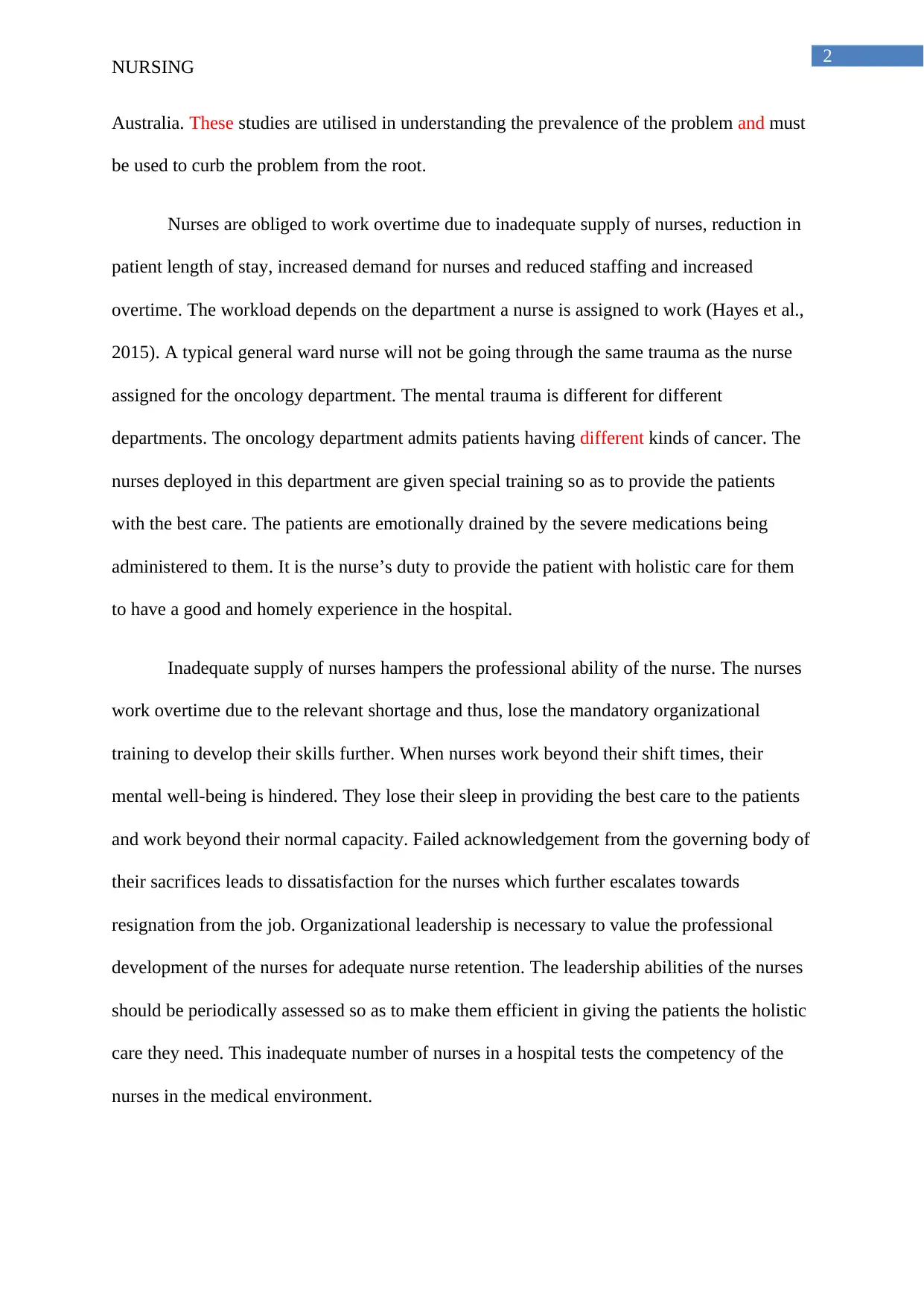
2
NURSING
Australia. These studies are utilised in understanding the prevalence of the problem and must
be used to curb the problem from the root.
Nurses are obliged to work overtime due to inadequate supply of nurses, reduction in
patient length of stay, increased demand for nurses and reduced staffing and increased
overtime. The workload depends on the department a nurse is assigned to work (Hayes et al.,
2015). A typical general ward nurse will not be going through the same trauma as the nurse
assigned for the oncology department. The mental trauma is different for different
departments. The oncology department admits patients having different kinds of cancer. The
nurses deployed in this department are given special training so as to provide the patients
with the best care. The patients are emotionally drained by the severe medications being
administered to them. It is the nurse’s duty to provide the patient with holistic care for them
to have a good and homely experience in the hospital.
Inadequate supply of nurses hampers the professional ability of the nurse. The nurses
work overtime due to the relevant shortage and thus, lose the mandatory organizational
training to develop their skills further. When nurses work beyond their shift times, their
mental well-being is hindered. They lose their sleep in providing the best care to the patients
and work beyond their normal capacity. Failed acknowledgement from the governing body of
their sacrifices leads to dissatisfaction for the nurses which further escalates towards
resignation from the job. Organizational leadership is necessary to value the professional
development of the nurses for adequate nurse retention. The leadership abilities of the nurses
should be periodically assessed so as to make them efficient in giving the patients the holistic
care they need. This inadequate number of nurses in a hospital tests the competency of the
nurses in the medical environment.
NURSING
Australia. These studies are utilised in understanding the prevalence of the problem and must
be used to curb the problem from the root.
Nurses are obliged to work overtime due to inadequate supply of nurses, reduction in
patient length of stay, increased demand for nurses and reduced staffing and increased
overtime. The workload depends on the department a nurse is assigned to work (Hayes et al.,
2015). A typical general ward nurse will not be going through the same trauma as the nurse
assigned for the oncology department. The mental trauma is different for different
departments. The oncology department admits patients having different kinds of cancer. The
nurses deployed in this department are given special training so as to provide the patients
with the best care. The patients are emotionally drained by the severe medications being
administered to them. It is the nurse’s duty to provide the patient with holistic care for them
to have a good and homely experience in the hospital.
Inadequate supply of nurses hampers the professional ability of the nurse. The nurses
work overtime due to the relevant shortage and thus, lose the mandatory organizational
training to develop their skills further. When nurses work beyond their shift times, their
mental well-being is hindered. They lose their sleep in providing the best care to the patients
and work beyond their normal capacity. Failed acknowledgement from the governing body of
their sacrifices leads to dissatisfaction for the nurses which further escalates towards
resignation from the job. Organizational leadership is necessary to value the professional
development of the nurses for adequate nurse retention. The leadership abilities of the nurses
should be periodically assessed so as to make them efficient in giving the patients the holistic
care they need. This inadequate number of nurses in a hospital tests the competency of the
nurses in the medical environment.
⊘ This is a preview!⊘
Do you want full access?
Subscribe today to unlock all pages.

Trusted by 1+ million students worldwide
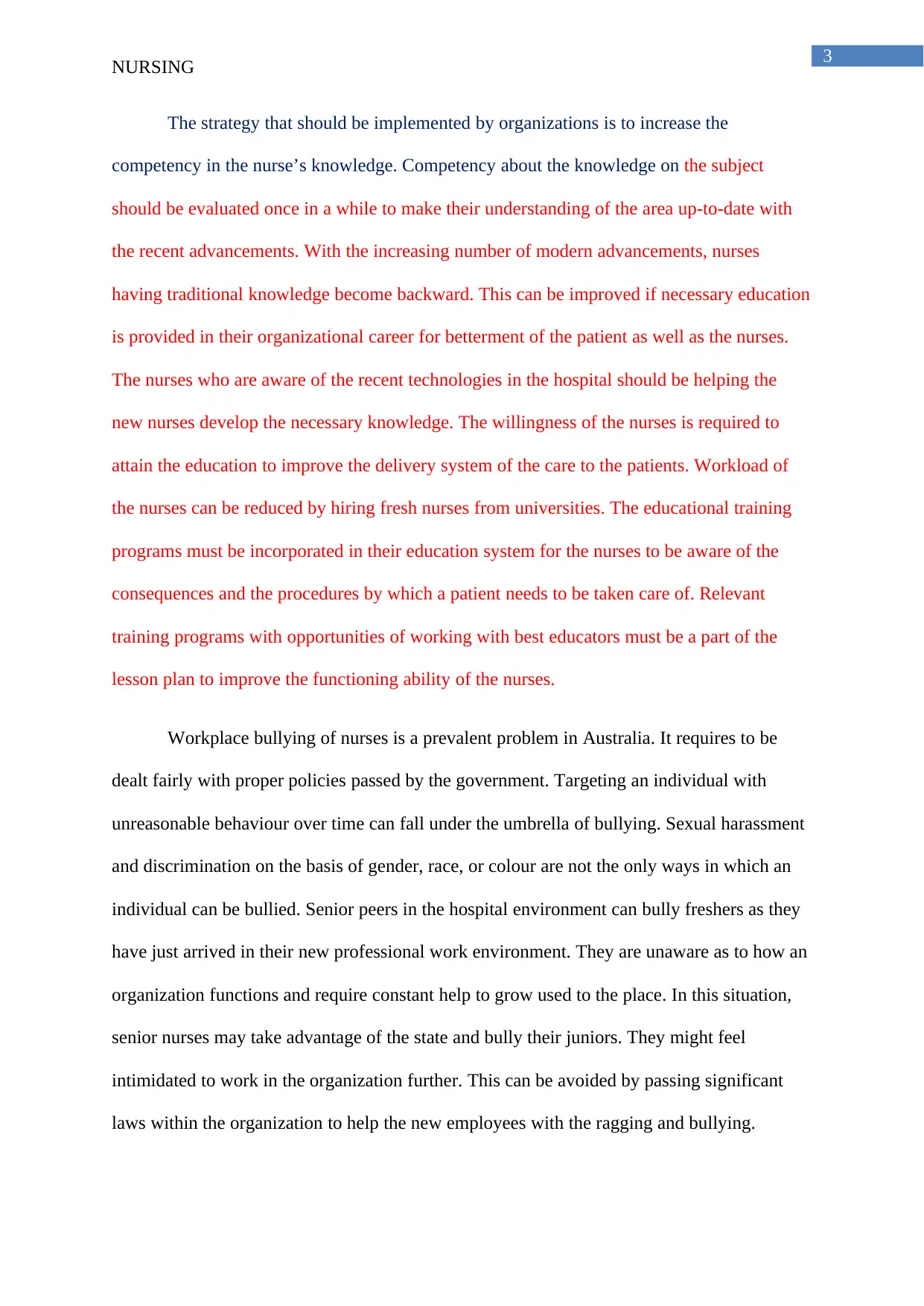
3
NURSING
The strategy that should be implemented by organizations is to increase the
competency in the nurse’s knowledge. Competency about the knowledge on the subject
should be evaluated once in a while to make their understanding of the area up-to-date with
the recent advancements. With the increasing number of modern advancements, nurses
having traditional knowledge become backward. This can be improved if necessary education
is provided in their organizational career for betterment of the patient as well as the nurses.
The nurses who are aware of the recent technologies in the hospital should be helping the
new nurses develop the necessary knowledge. The willingness of the nurses is required to
attain the education to improve the delivery system of the care to the patients. Workload of
the nurses can be reduced by hiring fresh nurses from universities. The educational training
programs must be incorporated in their education system for the nurses to be aware of the
consequences and the procedures by which a patient needs to be taken care of. Relevant
training programs with opportunities of working with best educators must be a part of the
lesson plan to improve the functioning ability of the nurses.
Workplace bullying of nurses is a prevalent problem in Australia. It requires to be
dealt fairly with proper policies passed by the government. Targeting an individual with
unreasonable behaviour over time can fall under the umbrella of bullying. Sexual harassment
and discrimination on the basis of gender, race, or colour are not the only ways in which an
individual can be bullied. Senior peers in the hospital environment can bully freshers as they
have just arrived in their new professional work environment. They are unaware as to how an
organization functions and require constant help to grow used to the place. In this situation,
senior nurses may take advantage of the state and bully their juniors. They might feel
intimidated to work in the organization further. This can be avoided by passing significant
laws within the organization to help the new employees with the ragging and bullying.
NURSING
The strategy that should be implemented by organizations is to increase the
competency in the nurse’s knowledge. Competency about the knowledge on the subject
should be evaluated once in a while to make their understanding of the area up-to-date with
the recent advancements. With the increasing number of modern advancements, nurses
having traditional knowledge become backward. This can be improved if necessary education
is provided in their organizational career for betterment of the patient as well as the nurses.
The nurses who are aware of the recent technologies in the hospital should be helping the
new nurses develop the necessary knowledge. The willingness of the nurses is required to
attain the education to improve the delivery system of the care to the patients. Workload of
the nurses can be reduced by hiring fresh nurses from universities. The educational training
programs must be incorporated in their education system for the nurses to be aware of the
consequences and the procedures by which a patient needs to be taken care of. Relevant
training programs with opportunities of working with best educators must be a part of the
lesson plan to improve the functioning ability of the nurses.
Workplace bullying of nurses is a prevalent problem in Australia. It requires to be
dealt fairly with proper policies passed by the government. Targeting an individual with
unreasonable behaviour over time can fall under the umbrella of bullying. Sexual harassment
and discrimination on the basis of gender, race, or colour are not the only ways in which an
individual can be bullied. Senior peers in the hospital environment can bully freshers as they
have just arrived in their new professional work environment. They are unaware as to how an
organization functions and require constant help to grow used to the place. In this situation,
senior nurses may take advantage of the state and bully their juniors. They might feel
intimidated to work in the organization further. This can be avoided by passing significant
laws within the organization to help the new employees with the ragging and bullying.
Paraphrase This Document
Need a fresh take? Get an instant paraphrase of this document with our AI Paraphraser
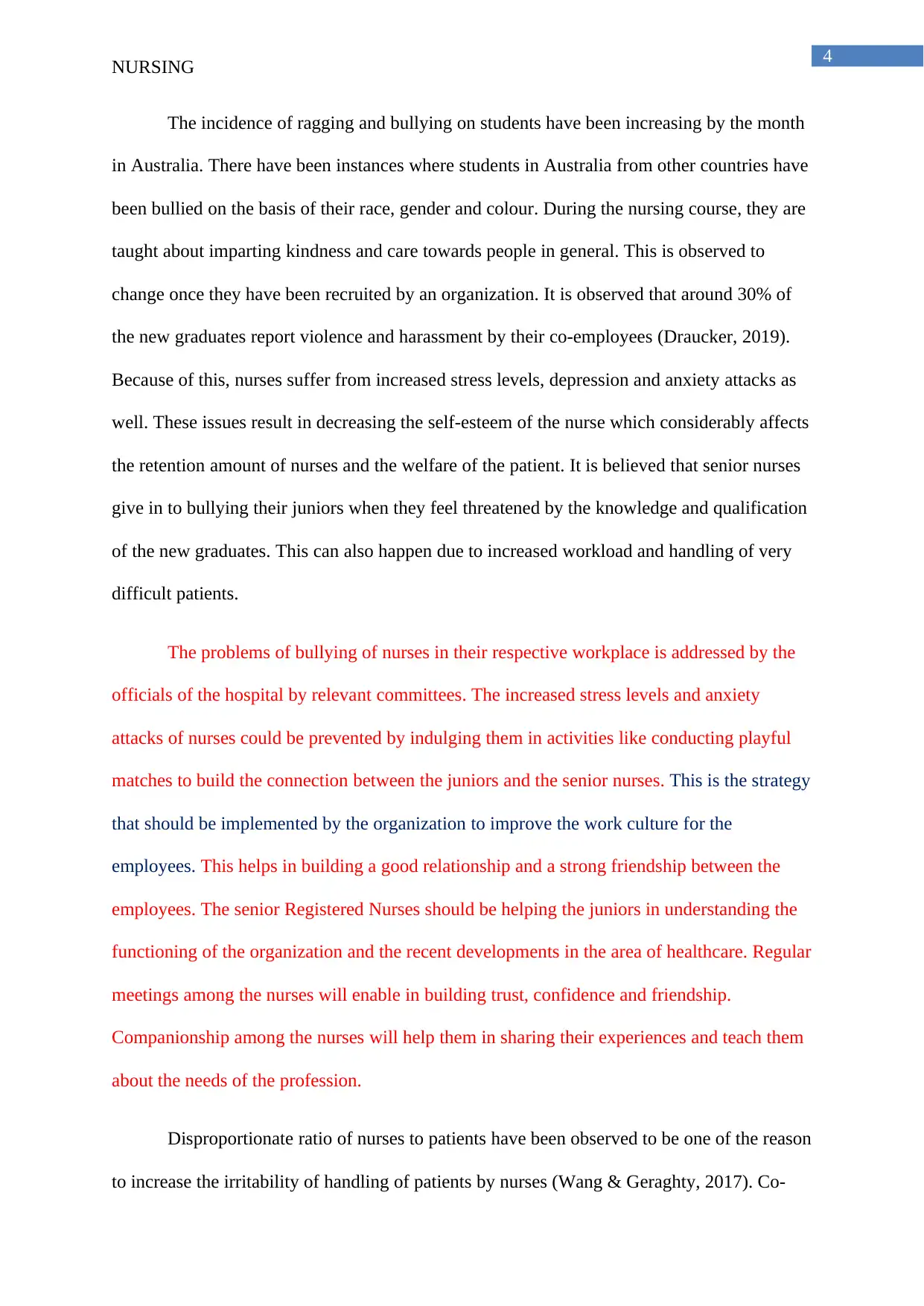
4
NURSING
The incidence of ragging and bullying on students have been increasing by the month
in Australia. There have been instances where students in Australia from other countries have
been bullied on the basis of their race, gender and colour. During the nursing course, they are
taught about imparting kindness and care towards people in general. This is observed to
change once they have been recruited by an organization. It is observed that around 30% of
the new graduates report violence and harassment by their co-employees (Draucker, 2019).
Because of this, nurses suffer from increased stress levels, depression and anxiety attacks as
well. These issues result in decreasing the self-esteem of the nurse which considerably affects
the retention amount of nurses and the welfare of the patient. It is believed that senior nurses
give in to bullying their juniors when they feel threatened by the knowledge and qualification
of the new graduates. This can also happen due to increased workload and handling of very
difficult patients.
The problems of bullying of nurses in their respective workplace is addressed by the
officials of the hospital by relevant committees. The increased stress levels and anxiety
attacks of nurses could be prevented by indulging them in activities like conducting playful
matches to build the connection between the juniors and the senior nurses. This is the strategy
that should be implemented by the organization to improve the work culture for the
employees. This helps in building a good relationship and a strong friendship between the
employees. The senior Registered Nurses should be helping the juniors in understanding the
functioning of the organization and the recent developments in the area of healthcare. Regular
meetings among the nurses will enable in building trust, confidence and friendship.
Companionship among the nurses will help them in sharing their experiences and teach them
about the needs of the profession.
Disproportionate ratio of nurses to patients have been observed to be one of the reason
to increase the irritability of handling of patients by nurses (Wang & Geraghty, 2017). Co-
NURSING
The incidence of ragging and bullying on students have been increasing by the month
in Australia. There have been instances where students in Australia from other countries have
been bullied on the basis of their race, gender and colour. During the nursing course, they are
taught about imparting kindness and care towards people in general. This is observed to
change once they have been recruited by an organization. It is observed that around 30% of
the new graduates report violence and harassment by their co-employees (Draucker, 2019).
Because of this, nurses suffer from increased stress levels, depression and anxiety attacks as
well. These issues result in decreasing the self-esteem of the nurse which considerably affects
the retention amount of nurses and the welfare of the patient. It is believed that senior nurses
give in to bullying their juniors when they feel threatened by the knowledge and qualification
of the new graduates. This can also happen due to increased workload and handling of very
difficult patients.
The problems of bullying of nurses in their respective workplace is addressed by the
officials of the hospital by relevant committees. The increased stress levels and anxiety
attacks of nurses could be prevented by indulging them in activities like conducting playful
matches to build the connection between the juniors and the senior nurses. This is the strategy
that should be implemented by the organization to improve the work culture for the
employees. This helps in building a good relationship and a strong friendship between the
employees. The senior Registered Nurses should be helping the juniors in understanding the
functioning of the organization and the recent developments in the area of healthcare. Regular
meetings among the nurses will enable in building trust, confidence and friendship.
Companionship among the nurses will help them in sharing their experiences and teach them
about the needs of the profession.
Disproportionate ratio of nurses to patients have been observed to be one of the reason
to increase the irritability of handling of patients by nurses (Wang & Geraghty, 2017). Co-
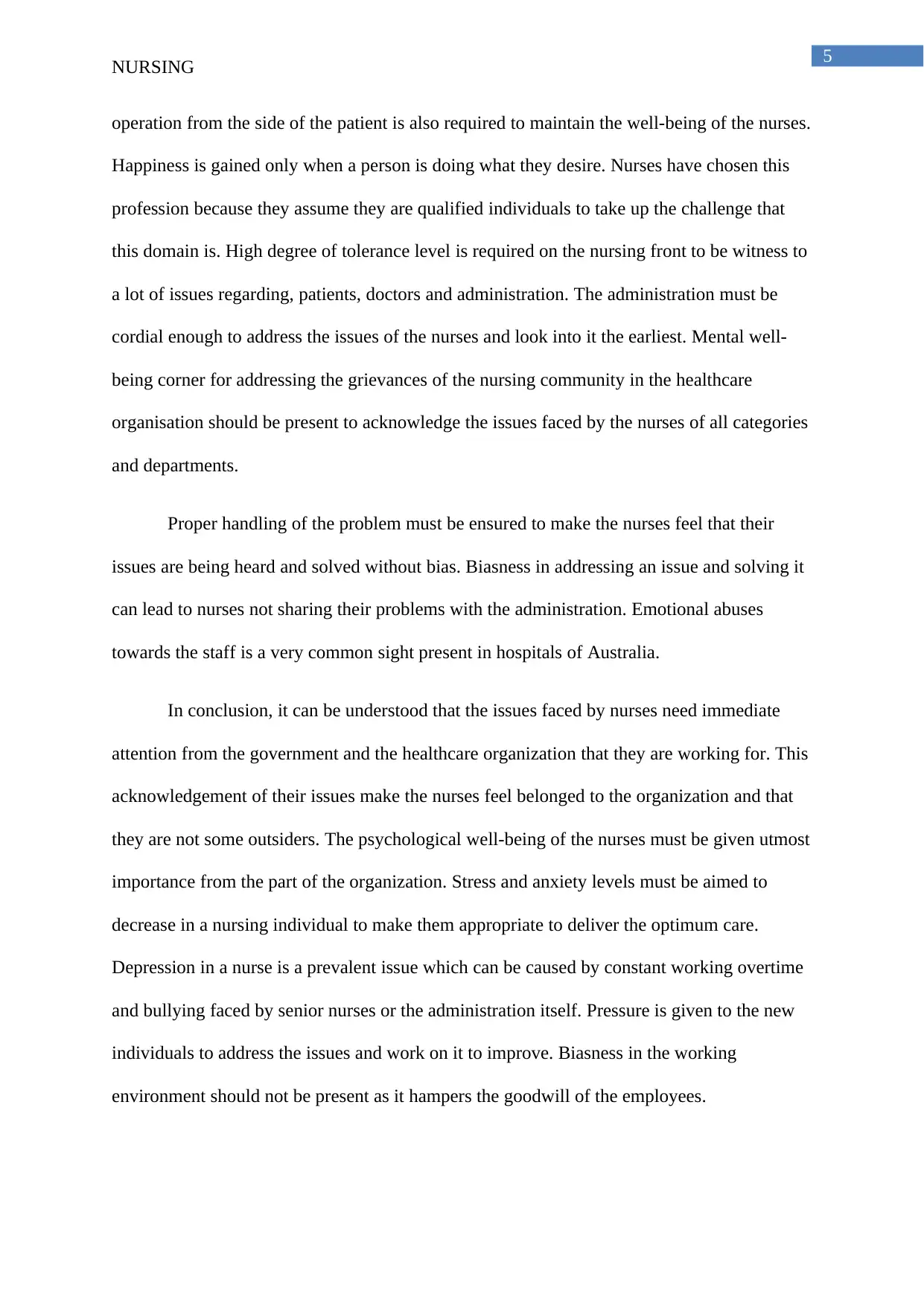
5
NURSING
operation from the side of the patient is also required to maintain the well-being of the nurses.
Happiness is gained only when a person is doing what they desire. Nurses have chosen this
profession because they assume they are qualified individuals to take up the challenge that
this domain is. High degree of tolerance level is required on the nursing front to be witness to
a lot of issues regarding, patients, doctors and administration. The administration must be
cordial enough to address the issues of the nurses and look into it the earliest. Mental well-
being corner for addressing the grievances of the nursing community in the healthcare
organisation should be present to acknowledge the issues faced by the nurses of all categories
and departments.
Proper handling of the problem must be ensured to make the nurses feel that their
issues are being heard and solved without bias. Biasness in addressing an issue and solving it
can lead to nurses not sharing their problems with the administration. Emotional abuses
towards the staff is a very common sight present in hospitals of Australia.
In conclusion, it can be understood that the issues faced by nurses need immediate
attention from the government and the healthcare organization that they are working for. This
acknowledgement of their issues make the nurses feel belonged to the organization and that
they are not some outsiders. The psychological well-being of the nurses must be given utmost
importance from the part of the organization. Stress and anxiety levels must be aimed to
decrease in a nursing individual to make them appropriate to deliver the optimum care.
Depression in a nurse is a prevalent issue which can be caused by constant working overtime
and bullying faced by senior nurses or the administration itself. Pressure is given to the new
individuals to address the issues and work on it to improve. Biasness in the working
environment should not be present as it hampers the goodwill of the employees.
NURSING
operation from the side of the patient is also required to maintain the well-being of the nurses.
Happiness is gained only when a person is doing what they desire. Nurses have chosen this
profession because they assume they are qualified individuals to take up the challenge that
this domain is. High degree of tolerance level is required on the nursing front to be witness to
a lot of issues regarding, patients, doctors and administration. The administration must be
cordial enough to address the issues of the nurses and look into it the earliest. Mental well-
being corner for addressing the grievances of the nursing community in the healthcare
organisation should be present to acknowledge the issues faced by the nurses of all categories
and departments.
Proper handling of the problem must be ensured to make the nurses feel that their
issues are being heard and solved without bias. Biasness in addressing an issue and solving it
can lead to nurses not sharing their problems with the administration. Emotional abuses
towards the staff is a very common sight present in hospitals of Australia.
In conclusion, it can be understood that the issues faced by nurses need immediate
attention from the government and the healthcare organization that they are working for. This
acknowledgement of their issues make the nurses feel belonged to the organization and that
they are not some outsiders. The psychological well-being of the nurses must be given utmost
importance from the part of the organization. Stress and anxiety levels must be aimed to
decrease in a nursing individual to make them appropriate to deliver the optimum care.
Depression in a nurse is a prevalent issue which can be caused by constant working overtime
and bullying faced by senior nurses or the administration itself. Pressure is given to the new
individuals to address the issues and work on it to improve. Biasness in the working
environment should not be present as it hampers the goodwill of the employees.
⊘ This is a preview!⊘
Do you want full access?
Subscribe today to unlock all pages.

Trusted by 1+ million students worldwide
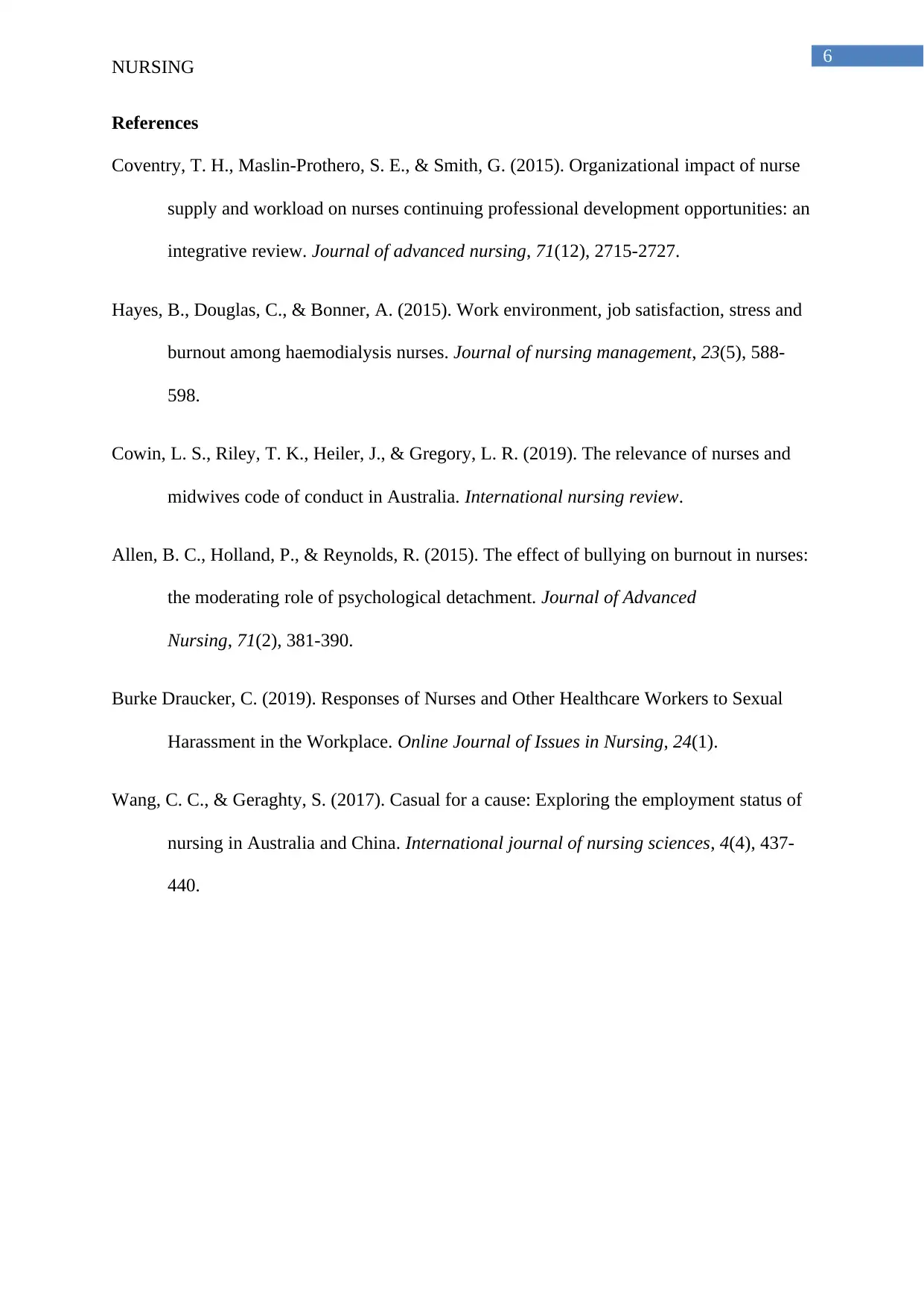
6
NURSING
References
Coventry, T. H., Maslin‐Prothero, S. E., & Smith, G. (2015). Organizational impact of nurse
supply and workload on nurses continuing professional development opportunities: an
integrative review. Journal of advanced nursing, 71(12), 2715-2727.
Hayes, B., Douglas, C., & Bonner, A. (2015). Work environment, job satisfaction, stress and
burnout among haemodialysis nurses. Journal of nursing management, 23(5), 588-
598.
Cowin, L. S., Riley, T. K., Heiler, J., & Gregory, L. R. (2019). The relevance of nurses and
midwives code of conduct in Australia. International nursing review.
Allen, B. C., Holland, P., & Reynolds, R. (2015). The effect of bullying on burnout in nurses:
the moderating role of psychological detachment. Journal of Advanced
Nursing, 71(2), 381-390.
Burke Draucker, C. (2019). Responses of Nurses and Other Healthcare Workers to Sexual
Harassment in the Workplace. Online Journal of Issues in Nursing, 24(1).
Wang, C. C., & Geraghty, S. (2017). Casual for a cause: Exploring the employment status of
nursing in Australia and China. International journal of nursing sciences, 4(4), 437-
440.
NURSING
References
Coventry, T. H., Maslin‐Prothero, S. E., & Smith, G. (2015). Organizational impact of nurse
supply and workload on nurses continuing professional development opportunities: an
integrative review. Journal of advanced nursing, 71(12), 2715-2727.
Hayes, B., Douglas, C., & Bonner, A. (2015). Work environment, job satisfaction, stress and
burnout among haemodialysis nurses. Journal of nursing management, 23(5), 588-
598.
Cowin, L. S., Riley, T. K., Heiler, J., & Gregory, L. R. (2019). The relevance of nurses and
midwives code of conduct in Australia. International nursing review.
Allen, B. C., Holland, P., & Reynolds, R. (2015). The effect of bullying on burnout in nurses:
the moderating role of psychological detachment. Journal of Advanced
Nursing, 71(2), 381-390.
Burke Draucker, C. (2019). Responses of Nurses and Other Healthcare Workers to Sexual
Harassment in the Workplace. Online Journal of Issues in Nursing, 24(1).
Wang, C. C., & Geraghty, S. (2017). Casual for a cause: Exploring the employment status of
nursing in Australia and China. International journal of nursing sciences, 4(4), 437-
440.
1 out of 7
Related Documents
Your All-in-One AI-Powered Toolkit for Academic Success.
+13062052269
info@desklib.com
Available 24*7 on WhatsApp / Email
![[object Object]](/_next/static/media/star-bottom.7253800d.svg)
Unlock your academic potential
Copyright © 2020–2026 A2Z Services. All Rights Reserved. Developed and managed by ZUCOL.





